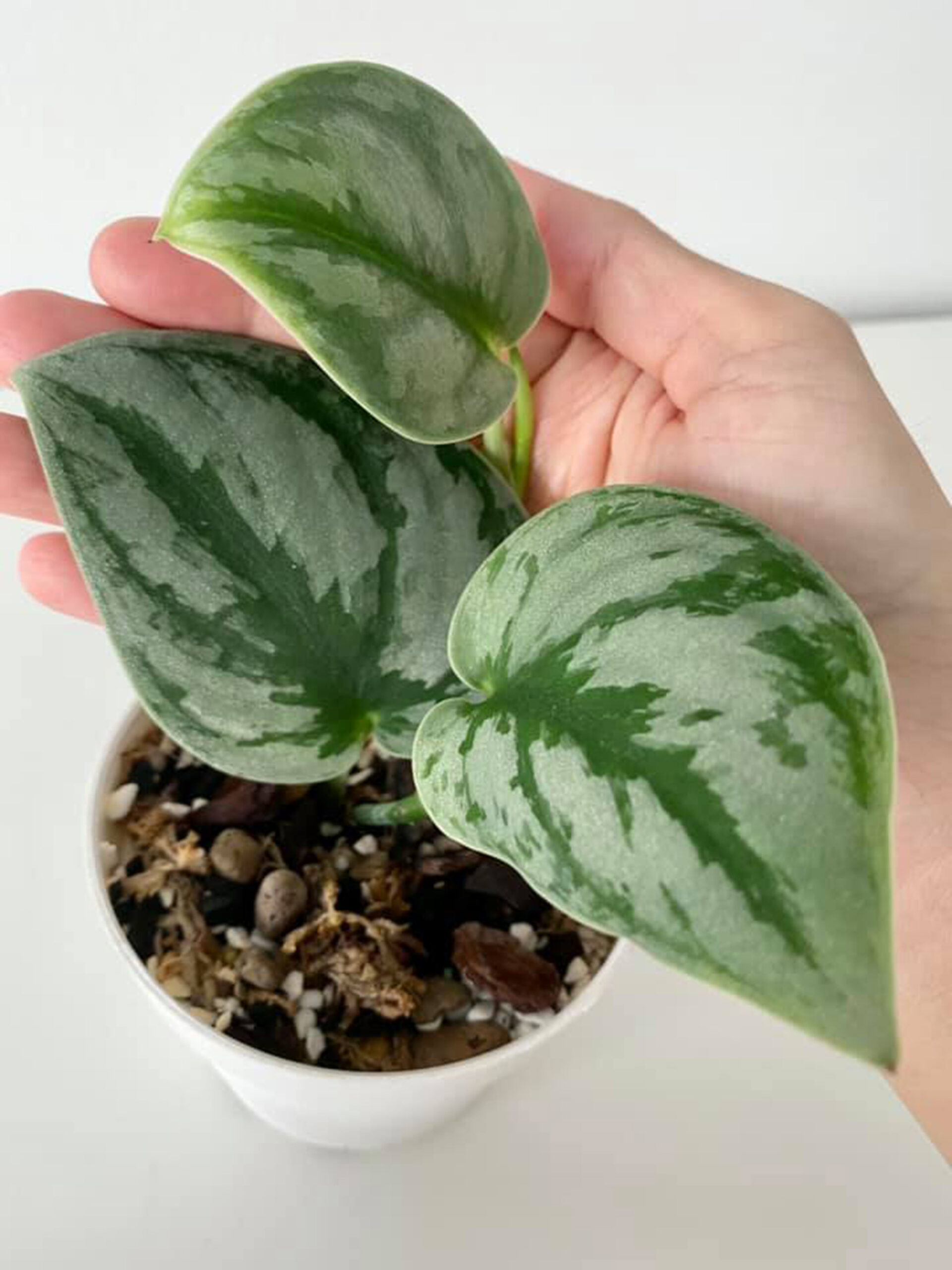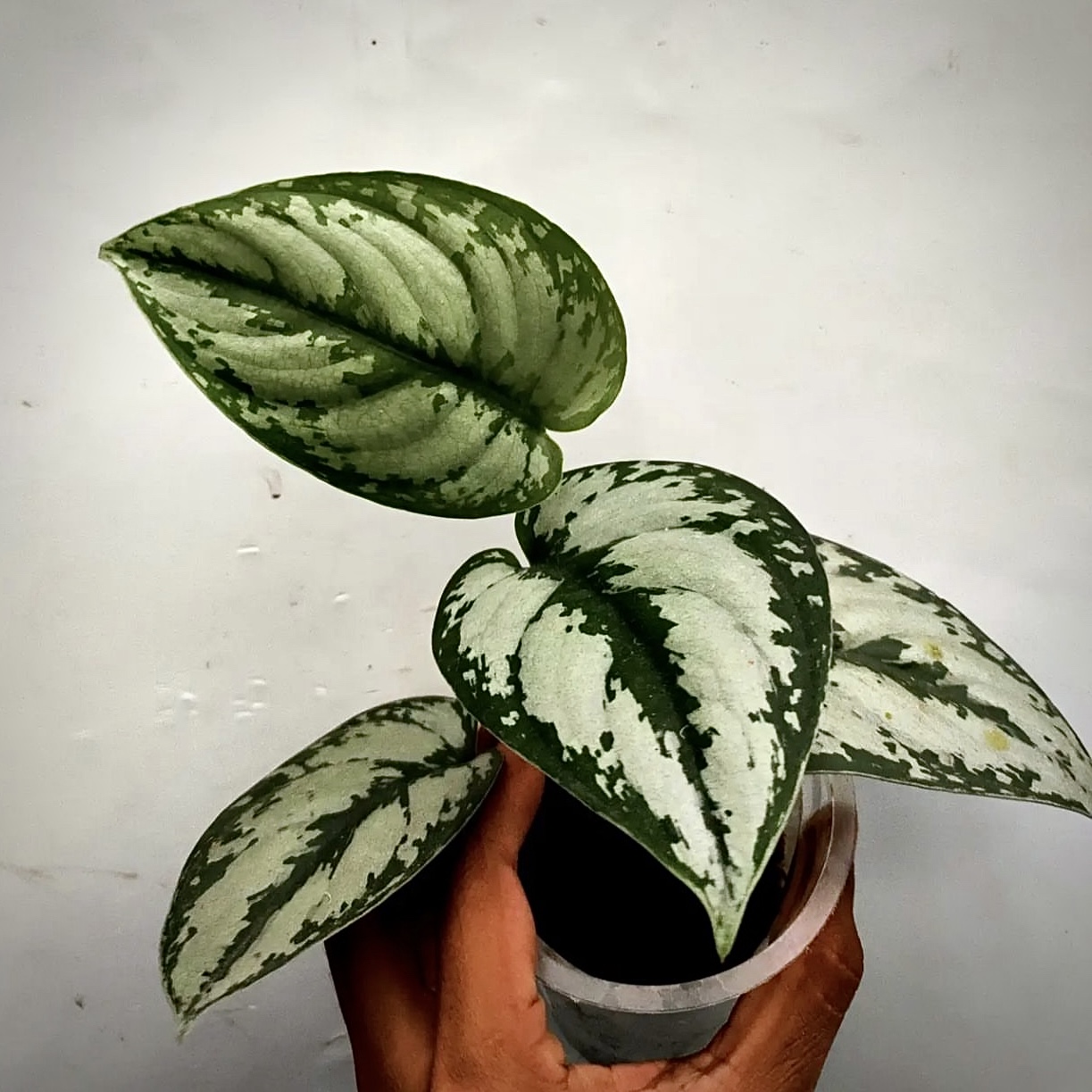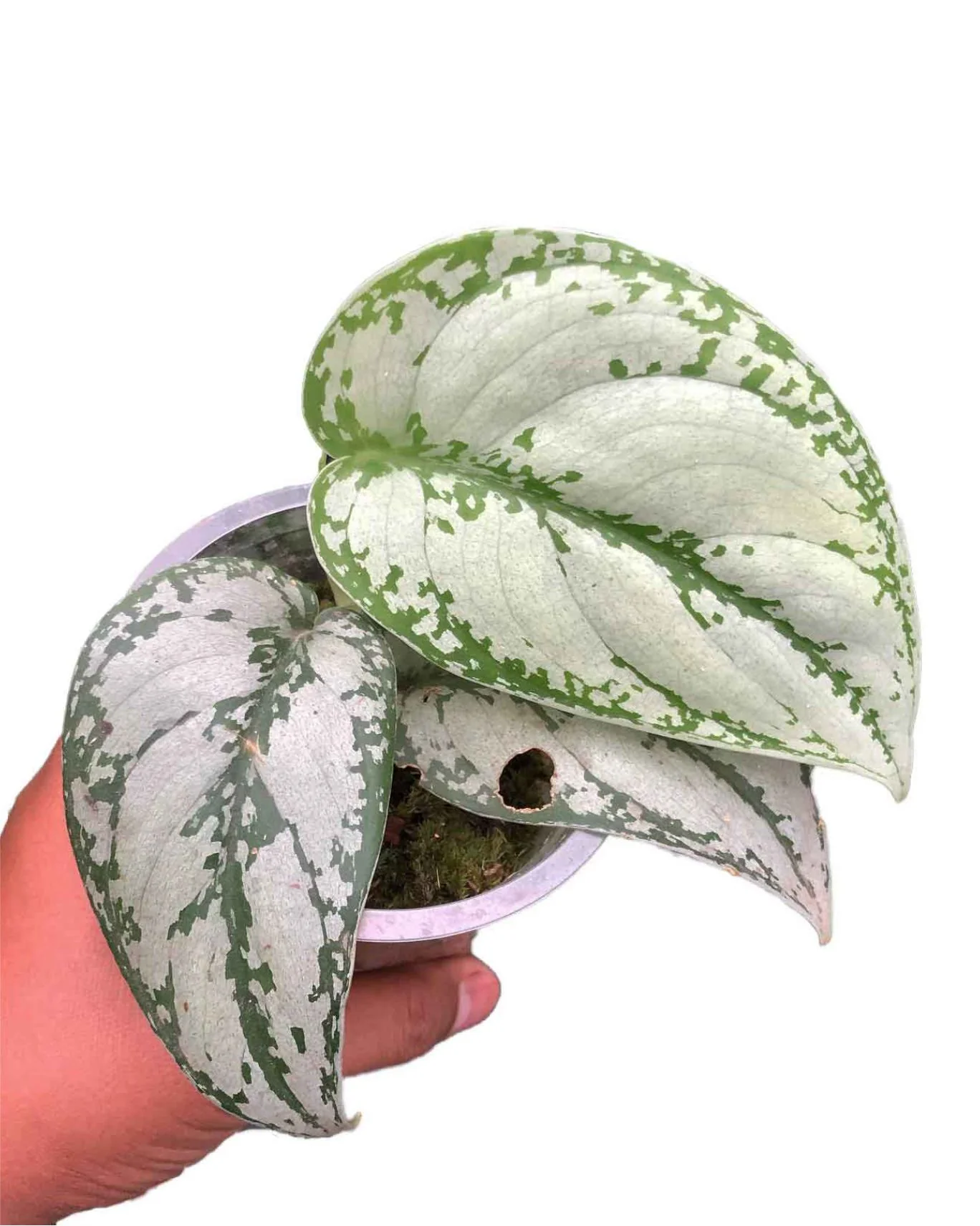Unlock the Beauty of Scindapsus Silver Princess in 5 Easy Steps!
The Scindapsus Silver Princess, also known as Scindapsus Pictus 'Exotica', is a gorgeous houseplant admired for its silvery-green leaves with dark green veining. Native to Southeast Asia, this vining plant is relatively easy to care for but unlocking its full beauty requires following some key tips.

Importance of Proper Lighting
The Scindapsus Silver Princess thrives in bright, indirect light. This means placing it near a sunny window where it receives plenty of light but is protected from direct sun exposure. Direct sun will scorch and yellow the leaves. Bright light keeps the plant's foliage vibrant and new growth coming. Insufficient light causes leggy growth.
Ideal Light Conditions
An east or west-facing window where the plant gets 4-6 hours of non-direct sun exposure works perfectly. A north window can work too if it's bright enough. Monitor the plant's growth and move it if needed until you find its happy place light-wise. Use sheer curtains to gently filter harsh afternoon sun if needed.
"For those new to Scindapsus care, it's crucial to understand the importance of light. To get more detailed advice on light requirements and positioning, take a look at "Scindapsus 101: A Beginner's Guide to Understanding and Growing", which offers comprehensive insights on ideal lighting conditions for these plants."
Soil Needs of this Plant
The Scindapsus Silver Princess prefers loose, porous potting mixes that drain well and still retain some moisture. Soils that stay soggy will lead to root rot. A quality potting soil amended with perlite, orchid bark or horticulture charcoal to improve drainage works beautifully.
Best Soil Components
Look for potting mixes containing ingredients like peat moss, coconut coir and compost. Or create your own mix using 2 parts potting soil, 1 part perlite or orchid bark for aeration and 1 part compost or worm castings for moisture retention. Adding some horticultural charcoal can help prevent overwatering issues.
"Choosing the right soil mix is key for the health of your Scindapsus Silver Princess. To explore the best soil compositions and learn more about their specific needs, refer to the guide "How to Grow Scindapsus in 5 Easy Steps", which includes valuable tips on soil preparation and maintenance."

"Discover the captivating beauty of Scindapsus Silver Princess. Click now to add this stunning plant to your collection and transform your space with its lush, vein-rich leaves!"
Plant's Water Requirements
The thick, succulent-like leaves and stems of the Silver Princess enable it to tolerate some drying of the soil. But it still prefers consistently moist (not soggy) soil. Allow the top inch of soil to dry out between waterings then soak the soil completely. Insufficient watering causes foliage to droop.
Tips for Proper Watering
Always check the soil before watering, not just water on a schedule. In winter when growth slows, less frequent watering is needed.Raise humidity around the plant by misting daily or placing the pot on a pebble tray filled with water.Filtered or distilled water is best to prevent leaf tip burn and white mineral deposits on the foliage.
Benefits of Higher Humidity
Increased humidity benefits the Silver Princess by preventing brown leaf tips and margins and keeping its graceful foliage looking lush. Its native humid tropical habitat means higher humidity supports healthier growth.
Ideas for Boosting Humidity
Group houseplants together to raise surrounding humidity.Mist plant daily using a spray bottle filled with distilled or filtered water kept at room temperature.Use a humidifier and adjust to 40-50% humidity if possible.Place pot on a pebble tray filled with water, making sure the bottom of the pot never sits directly in water.

Fertilizer Impact on Growth
While a very adaptable plant, the Scindapsus Silver Princess grows best with monthly feedings when actively growing in spring and summer. Fertilizer fuels production of new leaves and stems and keeps foliage full and vibrant. But excess fertilizer can burn roots and leaves.
Type of Fertilizer to Use
Choose a balanced liquid houseplant fertilizer or an all-purpose water soluble formula. Dilute to half strength and fertilize every 2-4 weeks during the growing period of spring through summer. In fall and winter, scale back to fertilizing every 6-8 weeks if at all.
"Understanding the right type and amount of fertilizer is critical for the growth of your Silver Princess. For a thorough understanding of Scindapsus fertilization needs, including the Silver Princess, check out "The 5 Most Common Scindapsus Varieties You Might Not Know About". This document provides essential tips on how to fertilize these unique plants effectively."
With its gorgeous silver-splashed leaves, the Scindapsus Silver Princess brings standout beauty to any indoor space. Follow these 5 fundamental care tips of providing this tropical vine with proper moisture, humidity, light, soil and fertilizer and those eye-catching satiny leaves will flourish beautifully! Consistent care unlocks the real showstopper beauty of this plant over time.
- What is a Scindapsus Silver Princess?
- The Scindapsus Silver Princess is a popular houseplant known for its striking foliage. This plant is a variety of the Scindapsus genus and is particularly admired for its heart-shaped leaves that have a silvery sheen, giving it a unique and attractive appearance.
- How do I care for my Scindapsus Silver Princess?
- Scindapsus Silver Princess thrives in bright, indirect light and prefers a well-draining potting mix. Water the plant when the top inch of the soil feels dry. Avoid overwatering to prevent root rot. It also benefits from regular misting or a humid environment to mimic its native tropical habitat.
- Can Scindapsus Silver Princess grow in low light?
- While it can tolerate low light conditions, the Scindapsus Silver Princess may not thrive as well compared to being in bright, indirect light. In low light, its growth may slow down, and the leaves may lose some of their silver variegation.
- Is Scindapsus Silver Princess toxic to pets?
- Yes, the Scindapsus Silver Princess is considered toxic to pets if ingested. It contains calcium oxalate crystals which can cause irritation to the mouth, tongue, and throat of pets. It's advisable to keep this plant out of reach of pets.
- How often should I repot my Scindapsus Silver Princess?
- Typically, Scindapsus Silver Princess should be repotted every 1-2 years or when it becomes root-bound. When repotting, choose a pot that is slightly larger than the current one and use fresh potting mix to encourage healthy growth.
https://greenboog.com/unlock-the-beauty-of-scindapsus-silver-princess/

Step 1: Provide Bright, Indirect Light
Importance of Proper Lighting
The Scindapsus Silver Princess thrives in bright, indirect light. This means placing it near a sunny window where it receives plenty of light but is protected from direct sun exposure. Direct sun will scorch and yellow the leaves. Bright light keeps the plant's foliage vibrant and new growth coming. Insufficient light causes leggy growth.
Ideal Light Conditions
An east or west-facing window where the plant gets 4-6 hours of non-direct sun exposure works perfectly. A north window can work too if it's bright enough. Monitor the plant's growth and move it if needed until you find its happy place light-wise. Use sheer curtains to gently filter harsh afternoon sun if needed.
"For those new to Scindapsus care, it's crucial to understand the importance of light. To get more detailed advice on light requirements and positioning, take a look at "Scindapsus 101: A Beginner's Guide to Understanding and Growing", which offers comprehensive insights on ideal lighting conditions for these plants."
Step 2: Use Loose, Well-Draining Soil
Soil Needs of this Plant
The Scindapsus Silver Princess prefers loose, porous potting mixes that drain well and still retain some moisture. Soils that stay soggy will lead to root rot. A quality potting soil amended with perlite, orchid bark or horticulture charcoal to improve drainage works beautifully.
Best Soil Components
Look for potting mixes containing ingredients like peat moss, coconut coir and compost. Or create your own mix using 2 parts potting soil, 1 part perlite or orchid bark for aeration and 1 part compost or worm castings for moisture retention. Adding some horticultural charcoal can help prevent overwatering issues.
"Choosing the right soil mix is key for the health of your Scindapsus Silver Princess. To explore the best soil compositions and learn more about their specific needs, refer to the guide "How to Grow Scindapsus in 5 Easy Steps", which includes valuable tips on soil preparation and maintenance."

"Discover the captivating beauty of Scindapsus Silver Princess. Click now to add this stunning plant to your collection and transform your space with its lush, vein-rich leaves!"
Step 3: Water When Top Inch of Soil is Dry
Plant's Water Requirements
The thick, succulent-like leaves and stems of the Silver Princess enable it to tolerate some drying of the soil. But it still prefers consistently moist (not soggy) soil. Allow the top inch of soil to dry out between waterings then soak the soil completely. Insufficient watering causes foliage to droop.
Tips for Proper Watering
Always check the soil before watering, not just water on a schedule. In winter when growth slows, less frequent watering is needed.Raise humidity around the plant by misting daily or placing the pot on a pebble tray filled with water.Filtered or distilled water is best to prevent leaf tip burn and white mineral deposits on the foliage.
Step 4: Increase Humidity
Benefits of Higher Humidity
Increased humidity benefits the Silver Princess by preventing brown leaf tips and margins and keeping its graceful foliage looking lush. Its native humid tropical habitat means higher humidity supports healthier growth.
Ideas for Boosting Humidity
Group houseplants together to raise surrounding humidity.Mist plant daily using a spray bottle filled with distilled or filtered water kept at room temperature.Use a humidifier and adjust to 40-50% humidity if possible.Place pot on a pebble tray filled with water, making sure the bottom of the pot never sits directly in water.

Step 5: Fertilize Monthly During Growing Season
Fertilizer Impact on Growth
While a very adaptable plant, the Scindapsus Silver Princess grows best with monthly feedings when actively growing in spring and summer. Fertilizer fuels production of new leaves and stems and keeps foliage full and vibrant. But excess fertilizer can burn roots and leaves.
Type of Fertilizer to Use
Choose a balanced liquid houseplant fertilizer or an all-purpose water soluble formula. Dilute to half strength and fertilize every 2-4 weeks during the growing period of spring through summer. In fall and winter, scale back to fertilizing every 6-8 weeks if at all.
"Understanding the right type and amount of fertilizer is critical for the growth of your Silver Princess. For a thorough understanding of Scindapsus fertilization needs, including the Silver Princess, check out "The 5 Most Common Scindapsus Varieties You Might Not Know About". This document provides essential tips on how to fertilize these unique plants effectively."
Conclusion
With its gorgeous silver-splashed leaves, the Scindapsus Silver Princess brings standout beauty to any indoor space. Follow these 5 fundamental care tips of providing this tropical vine with proper moisture, humidity, light, soil and fertilizer and those eye-catching satiny leaves will flourish beautifully! Consistent care unlocks the real showstopper beauty of this plant over time.
FAQ
- What is a Scindapsus Silver Princess?
- The Scindapsus Silver Princess is a popular houseplant known for its striking foliage. This plant is a variety of the Scindapsus genus and is particularly admired for its heart-shaped leaves that have a silvery sheen, giving it a unique and attractive appearance.
- How do I care for my Scindapsus Silver Princess?
- Scindapsus Silver Princess thrives in bright, indirect light and prefers a well-draining potting mix. Water the plant when the top inch of the soil feels dry. Avoid overwatering to prevent root rot. It also benefits from regular misting or a humid environment to mimic its native tropical habitat.
- Can Scindapsus Silver Princess grow in low light?
- While it can tolerate low light conditions, the Scindapsus Silver Princess may not thrive as well compared to being in bright, indirect light. In low light, its growth may slow down, and the leaves may lose some of their silver variegation.
- Is Scindapsus Silver Princess toxic to pets?
- Yes, the Scindapsus Silver Princess is considered toxic to pets if ingested. It contains calcium oxalate crystals which can cause irritation to the mouth, tongue, and throat of pets. It's advisable to keep this plant out of reach of pets.
- How often should I repot my Scindapsus Silver Princess?
- Typically, Scindapsus Silver Princess should be repotted every 1-2 years or when it becomes root-bound. When repotting, choose a pot that is slightly larger than the current one and use fresh potting mix to encourage healthy growth.
https://greenboog.com/unlock-the-beauty-of-scindapsus-silver-princess/
Nhận xét
Đăng nhận xét